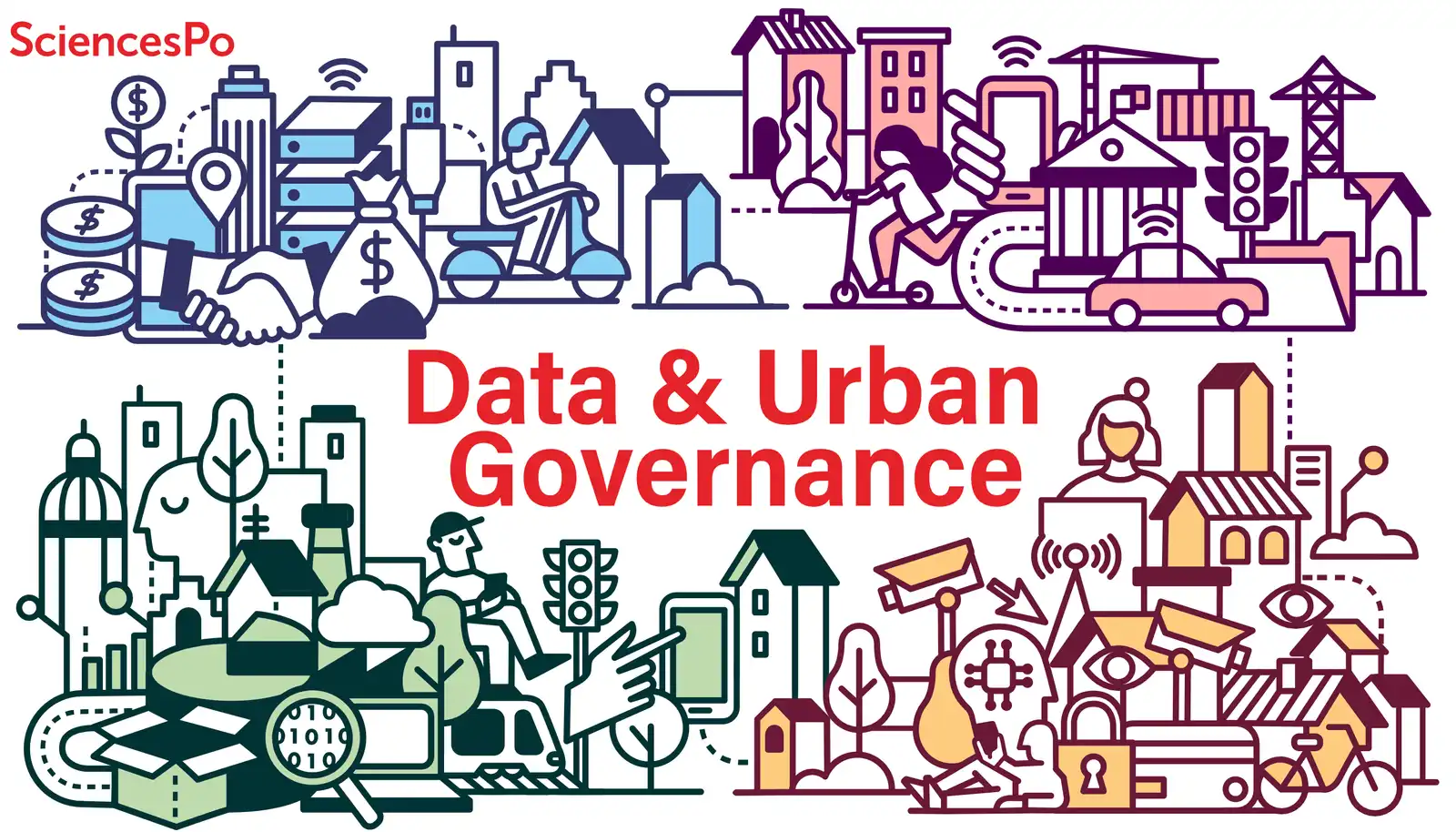
Home>Research & Chairs>Cities and digital technology Chair>Research & Publications
Research & Publications - Cities and Digital Technology Chair
Cities undergo transformations whose significance and impacts are not yet well perceived. « The smart city driven by digital technology, is poised to replace the typical networked city of the industrial era, whose success was built on its hard infrastructure, from roads to water supply and sanitation systems, not only as a technological optimum but also as a social and political project » (Antoine Picon, Smart cities, Wiley, 2015). The development of digital technologies into cities changes individual and collective practices, transform coordination, business models and lead to the introduction of new stakeholders into urban policies. How do these evolutions question urban policies and transform urban governance?
Based on comparative analysis, the Chair aims to question the impact of digital technologies on urban governance, following four main axes:
- Politics of urban data
- New stakeholders of urban policies (IT companies, platforms, etc.)
- The cities’ strategies and their diverse modes of governance
- The interaction between digital and territories (representation, infrastructure, socio-spatial inequalities, urban/rural relationship, etc.)
At the intersection of these axes and through case studies, the Chair aims to produce a cartography that represents the various meanings of digital cities and their socio-political issues to highlight the transformation of urban governance.
Mooc “Data and urban governance”

This course handles questions about the impact of data and how city life is structured, as it influences coalitions, actors, instruments, policies, and forms of regulation.
- 10 hours of training
- In French or in English
- Available for free on the Coursera platform
Working papers
- N°01/2023 Clément Renaud, Global entanglements in digital territories. The Huagiangbei district in Shenzhen
- N°02/2022 : Quand la mobilité électrique fait sa transition numérique. Une analyse des fonctionnalités connectées des stations de recharge et leurs effets sur le projet urbain par Julia Frotey
- N°01/2022 : Le marché de la donnée au service de la transparence du marché du logement ? par Alexandre Coulondre et Claire Juillard
- N°04/2021 : Empreinte environnementale des systèmes numériques et gouvernance territoriale par Gauthier Roussilhe
- N°03/2021 : Fixer les caractéristiques d’un instrument de politique publique controversé : le compteur Linky par Thoma Lamb
- N°02/2021 : Ce que les données de signalement font aux pouvoirs urbains - Enquête sur l’application DansMaRue de la Ville de Paris par Jean-Baptiste Chambon
- N°01/2021 : Peur sur la ville. La sécurité numérique pour l’espace urbain en France par Myrtille Picaud
- N°06/2020 : Le développement logistique des métropoles : des enjeux de régulation exacerbés par le numérique par Nicolas Raimbault
- N°05/2020 : Les Smart Cities : un gouvernement par la performance à l’échelle locale ? par Myrtille Picaud
- N°04/2020 : Les plateformes de modélisation urbaine : des instruments aux finalités variées par Aubin Dodard
- N°03/2020 : Faire la smart city dans une ville moyenne française : De la numérisation des services publics à l’attractivité territoriale, les trajectoires entrepreneuriales de Béthune et Nevers par Maxime Vincent
- N°02/2020 : The Impact of Digital Firms on Urban Governance Model in China: An Empirical Analysis of the Smart City Brain Model in China (EN) par Sixiao Yang
- N°01/2020 : Produire des données de prix et de loyers à l’heure de la PropTech : Quel rôle pour l’État ? par Claire Juillard
- N°05/2019 : Rendre « intelligentes » les caméras déplacement du travail des opérateurs devidéosurveillance et redéfinition du soupçon par Florent Castagnino
- N°04/2019: Territoires numériques et transition énergétique : les limites de la croissance par Cécile Diguet & Fanny Lopez
- N°03/2019 : Quand le capteur leur donne la parole : la (difficile) représentation des usagers par le big data dans l’aménagement urbain par Antoine Courmont et Nicolas Rio
- N°02/2019 : La fabrique publique de la smart city parisienne par Ornella Zaza
- N°01/2019 : Beneath the surface of the Safe City: surveillance in the times of Chinese supremacy? (EN) par Alvaro Artigas
- N°02/2018 : "Où est passée la smart city ?" Firmes de l’économie numérique et gouvernement urbain par Antoine Courmont
- N°01/2018 : The value of data : An analysis of closed-urban-data-based and open-data-based business models (EN) par Bruno Carballa Smichowski
Conferences
Conference on 4 April 2019 : Data, platforms and cities
Conference on 3 May 2018 : Platforms and territories
Student's works
- Les politiques publiques locales en faveur des communs numériques et leurs effets. Comparaison entre Brest et Grenoble. ; by Lacalmette Gabriel, Gandolfo Lucas, Arrivé Louise
- Energy Data Accross European Cities. Divergences and convergences in sharing methods and uses of urban energy data ; by Jeanne Heaulme, Virgile Pütz, Lorenzo Silvestri et Oskar Steiner. Read the full report.
- The interplay between environmental and digital policies in European Contexts. A comparative analysis of Barcelona, Geneva, Lyon and Tallinn, a capstone by Laia Canavaggia, Winnky Chen, Mathilde Larive and Avigail Levy.
- Les civi tech : nouveaux acteurs du marché de la participation territoriale ? (FR) by Margaux Barlet, Mathieu Le Gall, Rubens Lexpert-Jamakortzian and Ophélie Tainguy
- "5G controversies in European cities", a capstone by Emma Barrier, Hugo d’Assenza-David, Bilal Haderbache, Christophe Mina, Mathilde Morchain & Teresa Quijano: read the Final report and the Executive Summary